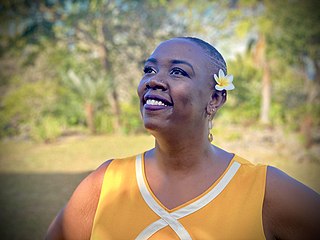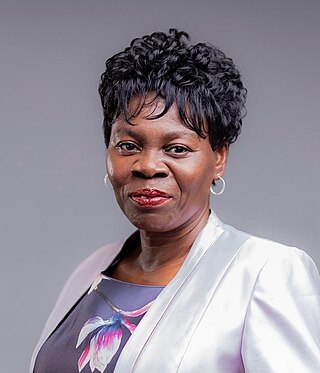Maseno University is a public university based in the Maseno district of the city of Kisumu, Kenya, situated along the Equator. It was fully fledged as a university in 2001, after being a constituent college of Moi University for a decade. It is one of public universities in Kenya. It has over 10,000 students pursuing programs offered in the university campuses and it is currently ranked among the best universities in Kenya.

The African Academy of Sciences (AAS) is a non-aligned, non-political, not-for-profit, pan-African learned society formed in 1985.

The University of Nairobi is a collegiate research university based in Nairobi. It is the largest university in Kenya. Although its history as an educational institution dates back to 1956, it did not become an independent university until 1970. During that year, the University of East Africa was split into three independent universities: the Makerere University in Uganda, the University of Dar es Salaam in Tanzania, and the University of Nairobi in Kenya.

Kenyatta University (KU) is a public research university with its main campus in Nairobi. It acquired the status of university in 1985, being the third university after University of Nairobi (1970) and Moi University (1984). As of October 2014, it was one of 23 public universities in the country.
Paul Tiyambe Zeleza is a Malawian historian, literary critic, novelist, short-story writer and blogger at The Zeleza Post. He was (2009) president of the African Studies Association. He was the Vice-President for Academic Affairs at Quinnipiac University. He is the current Vice Chancellor of the United States International University Africa, located in Nairobi, Kenya.
Thomas John Bisika is a social demographer and public health specialist, diplomat, and former health systems specialist at World Health Organization in Nigeria.He is the current Malawi High Commissioner to the United Kingdom.
Population Action International (PAI) is an international, non-governmental organization that uses research and advocacy to improve global access to family planning and reproductive health care. Its mission is to "ensure that every person has the right and access to sexual and reproductive health, so that humanity and the natural environment can exist in balance with fewer people living in poverty". PAI's headquarters is in Washington, D.C.

Korogocho is one of the largest slum neighbourhoods of Nairobi, Kenya. Home to 150,000 to 200,000 people pressed into 1.5 square kilometres, northeast of the city centre, Korogocho was founded as a shanty town on the then outskirts of the city.
Amici del Mondo World Friends Onlus is an independent Italian non-profit association of social utility for international cooperationWorld Friends is a Non-Governmental Organization recognized by the Italian Ministry of Foreign Affairs by Law no. 125 of 2014 updated to July 16, 2016, registered in the register of ONLUS and the Register of Legal Persons D.P.R. 361. Recognized by the Government of Kenya as a Non-governmental organization (NGO), in 2011 obtained the same accreditation at the Italian Ministry of Foreign Affairs. Established in 2001, the association has its head offices in Rome and has volunteer-based regional offices in Piedmont, Liguria, Lombardy, Friuli-Venezia Giulia, Veneto, Emilia-Romagna, Lazio, Sicily. The association's African office is based in Nairobi.

United States International University Africa, also known as USIU Africa, is a private university in Kenya, the largest economy in the East African Community. The university is accredited by the Commission for Higher Education (CUE) in Kenya and by the Western Association of Schools and Colleges (WASC) in the United States.
Stellah Wairimu Bosire, is a Kenyan physician, corporate executive, human rights activist and author, a former co-executive director of Uhai Eashri and previously served as the chief executive officer of Kenya Medical Association and as the vice-chair of the HIV and AIDS Tribunal of Kenya.

Wanjiru Kamau-Rutenberg is an Executive in Residence at Schmidt Futures. Before that she was Director of African Women in Agricultural Research and Development (AWARD). Wanjiru is also the Founder and past Executive Director of Akili Dada, a leadership incubator for African girls and young women and a former Assistant Professor of Politics at the University of San Francisco.

Thomas M. Kariuki, is the founding and current Director of the Alliance for Accelerating Excellence in Science in Africa (AESA). The AESA platform was created in 2015 through a partnership of the African Academy of Sciences (AAS), the African Union Development Agency (AUDA-NEPAD), founding and funding global partners, and through a 2015 resolution of the summit of African Union Heads of Governments. He holds an honorary Professorship at the Liverpool School of Tropical Medicine, a Ph.D. in immunology from the University of York, [2] the presidential Order of Grand Warrior (OGW) for scientific leadership and public service, and is a Fellow of the African Academy of Sciences (FAAS)

Nyovani Janet Madise is the current Director of Research and Sustainable Development Policies and Head of the Malawi office of the African Institute for Development Policy. She is an advisor to the World Health Organization and a former professor at the University of Southampton in Demography and Social Statistics. Nyovani has over 100 peer-reviewed research publications that focus on global health issues to highlight the influence of social and economic factors on health in low-income countries.
Professor Laban Ayiro is a Kenyan academic, currently serving as the Vice Chancellor of Daystar University, a Christian, liberal arts university based in Nairobi, the capital and largest city of Kenya.
Susan Cotts Watkins is an American demographer. She has been a professor at Yale University and the University of Pennsylvania. She is now professor emerita at the University of Pennsylvania. Her research has focused on the impact of social networks on cultural change in the demography of the U.S., Western Europe, and Africa.
Cheikh Seydil Moctar Mbacké is a Senegalese statistician. He is a research fellow in the Center for Research on Applied Economics and Finance at the Université de Thiès in Senegal. He works in international development, with a particular focus on population and health research in Sub-Saharan Africa. Mbacke was elected a Foreign Associate of the National Academy of Sciences (NAS) in 2018.
James Patrick Manyenye Ntozi was an Ugandan retired academic and farmer. He worked as a researcher in demographics and statistics at Makerere University in Uganda, with his main research projects focusing on the HIV/AIDS epidemic in Africa, fertility, census-taking, and aging and the life cycle. A medical demographer and statistician by training, his areas of expertise include gauging needs assessment, conducting evaluations, and creating baseline studies. After retirement, he took up work as a farmer. In 2011, the book Demography of Uganda and Selected African Countries was published in honor of his research contributions. Professor Ntozi died on Wednesday 19 May 2021 in Kampala, Uganda.
Viwandani is an informal settlement in the city of Nairobi, Kenya. It is an electoral ward within the Makadara Constituency of Nairobi County. It borders on the Nairobi Industrial Area. The name "Viwandani" means "at the industrial zone" in Kiswahili. There are thirteen "villages" within the settlement: Jamaica, Kingstone, Lunga Lunga Centre, Lunga Lunga Donholm, Milimani, Paradise A, B, and C, Riverside, Sinai, Sinali Reli, Tetrapak, and Uchumi.
Walter Godfrey Jaoko is a Kenyan professor of medical microbiology and tropical medicine. He is the director of Kenya AIDS Vaccine Initiative (KAVI) and a professor at University of Nairobi, University of Alabama and Stellenbosch University.







